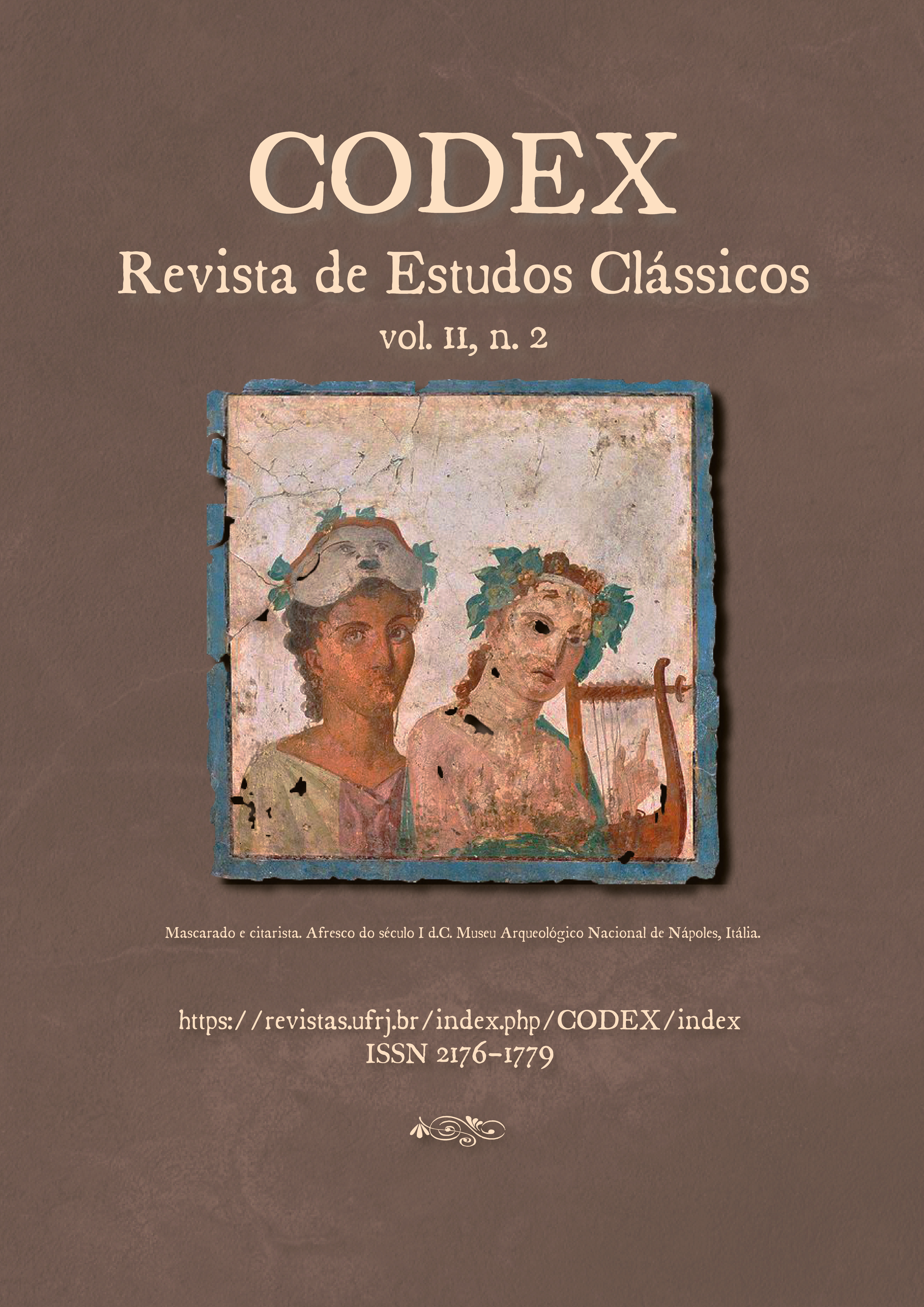Endeia and euporia, “lack” and “inventiveness”
the Socratic lexicon for the nature of eros in the Symposium
DOI:
https://doi.org/10.25187/codex.v11i2.57956Keywords:
eros , lack , euporia , logosAbstract
This paper focuses on the early parts of Socrates' speech in the Symposium, in which the philosopher describes the nature of eros, before discussing its effects. It is proposed that Plato introduces a specific vocabulary to describe the erotic phenomenon, which, unlike other approaches to desire in general across the corpus, tacitly rejects the model of filling and emptying (πλησμονή and κένωσις) more characteristic of those usually called appetites (ἐπιθυμίαι). In this dialogue, Socratic eros, an intermediary par excellence, oscillates between fleeting states of ἔνδεια, lack, and εὐπορία, “inventiveness”, without aiming at satiety. The first section of the paper focuses on the vocabulary of lack established, for the most part, in the elenchos of Agathon (199c-201d), a character whose thesis, based on divine superabundance, is refuted by the establishing of the needy and aporetic (resourceless) character of eros. In the second section, the choice of Poros (Resource) and Penia (Poverty) by Diotima as eros' parents (203b-204c) is analysed on the basis of the relevant uses of these terms in the preceding literature. It is through the interaction of parental characteristics that eros will be defined as "euporetic", which can be translated as “inventive”. By the establishing of the pair endeia (aporia) — euporia — familiar terms to the readers of the corpus for their eminently discursive application –, Socrates will be able to describe the expression of erotic desire, and specifically philosophical desire, as the incessant search for a logos.
Downloads
References
Primárias:
ARISTÓFANES. Pluto (A Riqueza). Tradução de Américo da Costa Ramalho. Brasília: Editora Universidade de Brasília, 1999.
HESÍODO. Teogonia. Tradução de Christian Werner. São Paulo: Hedra, 2013.
HOMERO. Ilíada. Tradução de Frederico Lourenço. São Paulo: Penguin Classics; Companhia das Letras, 2013.
PARMÊNIDES; XENÓFANES. Filósofos épicos I: Parmênides e Xenófanes, fragmentos. Tradução de Fernando Santoro. Rio de Janeiro: Hexis; Fundação Biblioteca Nacional, 2001.
PLATÃO. COOPER, J. M. (Ed.) Complete Works. Indianapolis: Hackett Publishing Company, 1997.
PLATON. Le Banquet. Tradução de Luc Brisson. Paris: GF Flammarion, 2007.
PLATÃO. BRISSON, L. (Dir.) Platon: Œuvres Complètes. Paris: Flammarion, 2008.
PLATÃO. Banquete. Tradução de Claudia Mársico, estudo preliminar por Lucas Soares. Buenos Aires: Miluno Editorial, 2009a.
PLATÃO. O Banquete. Tradução de Donaldo Schüler. Porto Alegre: L&PM, 2021a.
PLATÃO. O Banquete. Tradução de Irley Franco e Jaa Torrano Rio de Janeiro: Editora Loyola / PUC-Rio, 2021b.
PLATÃO. Sofista. Tradução de Henrique Murachco, Juvino Maia Jr. e José Trindade Santos. Lisboa: Calouste Gulbenkian, 2011.
PLATÃO. Teeteto; Crátilo. Tradução de Carlos Alberto Nunes. Belém: Universidade Federal do Pará, 1988.
PLATÃO. Timeu-Crítias. Tradução de Rodolfo Lopes. São Paulo: Annablume Clássica, 2012c.
TUCÍDIDES. História da Guerra do Peloponeso. Tradução de Mário da Gama Kury. Brasília: Editora Universidade de Brasília, 2001.
Secundárias:
AUBERT, E. H. O coro, a musa e as estrelas: estudo do fr. 5 Page de Álcman. Classica, v. 33, n. 1, pp. 11-30, 2020. DOI: https://doi.org/10.24277/classica.v33i1.858
BURY, R. G. The Symposium of Plato. 2 ed. Cambridge: W. Heffer and Sons, 1932.
CACIAGLI, S.; CAPRA, A.; GIOVANNELLI, M.; REGALI, M. Penia da Aristofane alla scena contemporanea. La forza drammatica di un personaggio anti-cômico. Lessico del Comico, v. I, pp. 78-97, 2016.
CAPRA, A. Stratagemmi comici da Aristofane a Platone Parte I. Il satiro ironico (Simposio, Nuvole e altro). Stratagemmi, v. 2, pp. 7-48, 2007.
CHANTRAINE, P. Dictionnaire étymologique de la langue grecque. Histoire des mots. Paris: Klincksieck, 1999.
CORRIGAN, K.; GLAZOV-CORRIGAN, E. Plato’s dialectic at play: argument, structure, and myth in the Symposium. University Park: Pennsylvania State University Press, 2004.
CUMMINS, W. J. “Eros”, “Epithumia”, and “Philia” in Plato. Apeiron, v. 15, n. 1, p. 10–18, 1981. DOI: https://doi.org/10.1515/APEIRON.1981.15.1.10
DETIENNE, M.; VERNANT, J-P. Métis: as astúcias da inteligência. Tradução de Filomena Yoshie Hirata. São Paulo: Odysseus Editora, 2008.
DOVER, K. J. Symposium. Cambridge: Cambridge University Press, 1980.
FIERRO, M. A. Elenchos y eros: el caso de Sócrates y Agatón en Smp. 199c-201a. Archai, n. 14, pp. 93-108, 2014. http://hdl.handle.net/11336/52103
FRÈRE, J. Les Grecs et le désir de l’être. Des préplatoniciens à Aristote. Paris: Les Belles Lettres, 1981.
PALUMBO, L. Eros e Linguaggio nel Simposio. Archai, n. 9, pp. 85-92, 2012. https://www.redalyc.org/pdf/5861/586161971010.pdf
SCHÜLER, D. Eros: Dialética e Retórica. São Paulo: Editora Edusp, 1992.
SHEFFIELD, F. C. C. Plato’s Symposium: the ethics of desire. Oxford: Oxford University Press, 2006.
Downloads
Published
How to Cite
Issue
Section
License
Copyright (c) 2024 Julia Guerreiro de Castro Zilio Novaes

This work is licensed under a Creative Commons Attribution-NonCommercial 4.0 International License.
This work is licensed under a Creative Commons Attribution-NonCommercial 4.0 International License.










